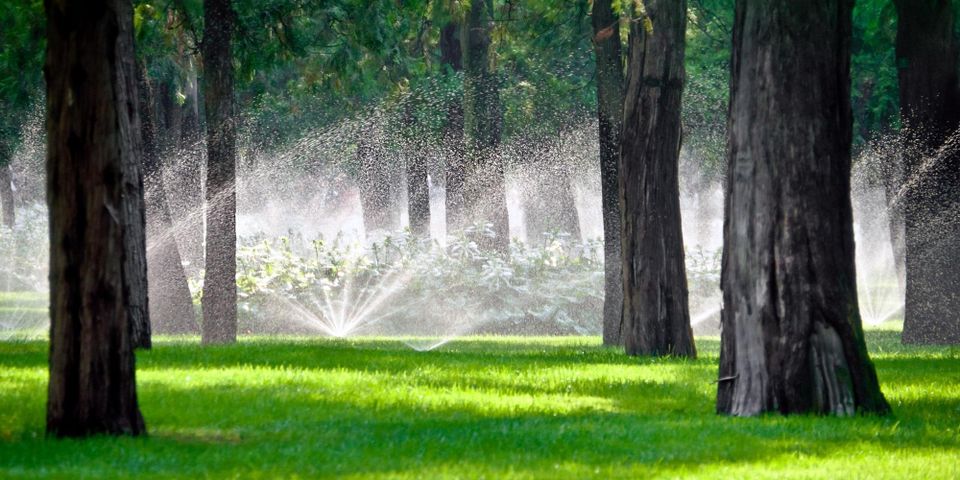
A sprinkler system applies a controlled amount of water to specific areas of your landscape, offering a dependable source of irrigation to create a healthy and vibrant space. However, you don't need to own many acres of property or have intricate landscaping to enjoy the benefits of a sprinkler system. Below is more information about the various options, how they work, and some maintenance tips.
What Are the Different Types of Sprinkler Systems?
Most sprinklers that modern homeowners use are in-ground systems. This means that your landscape contractors will install a network of pipes under the lawn, about 12 inches below the surface. Then, they will attach retractable sprinkler heads to the pipes in strategic areas to ensure the entire property receives water.
When the sprinkler system engages, and water moves through the pipes, the resulting pressure forces the sprinkler heads above the surface of the lawn. Thus, water will spray out of the heads as long as it flows through the pipes below. Once the water shuts off, the drop in pressure causes the heads to retract into the ground. These sprinklers are popular for both residential and commercial properties, as they allow large lawnmowers to travel across the grass easily.
For small spaces like flowerbeds, backyard gardens, or specific trees, there are other sprinkler types that don't use a high-powered spray of water. For example, bubblers, drip irrigation systems, and micro-sprinklers work similarly to larger systems, but they deliver water at a much slower rate. This ensures that you do not overwhelm smaller spaces, resulting in less evaporation and water runoff.
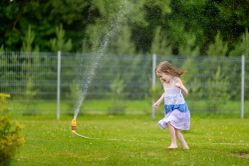 Aboveground sprinkler systems are another option, and they are perfect for homeowners who are budget conscious or have only a small area to irrigate. These systems attach to a standard garden hose to provide water throughout the area. You can choose from a variety of spray heads and patterns, including those that rotate, oscillate, or create a mist.
Aboveground sprinkler systems are another option, and they are perfect for homeowners who are budget conscious or have only a small area to irrigate. These systems attach to a standard garden hose to provide water throughout the area. You can choose from a variety of spray heads and patterns, including those that rotate, oscillate, or create a mist.
For larger lawns or agricultural settings, raised sprinklers are common. They function similarly to in-ground systems, with a network of pipes and sprinkler heads. However, the significant difference is that these systems sit above the ground, providing a similar effect to rain. They typically have wheels, allowing you to move them when necessary.
Another option for bigger greenspaces is a traveling sprinkler. Also called a tractor sprinkler, this option propels itself on a straight line through the field, watering each area as it moves. It provides a comprehensive watering from one hose point, and you don't need to move the system around manually.
What Are the Benefits of a Sprinkler System?
1. Control Watering
With sprinklers, you can ensure your lawn gets targeted watering as often as it needs. Many sprinklers have timers, so you can set them to engage on certain days or times. This allows you to water the lawn at the most optimal times, without being present. Also, all areas of your landscape may not need regular watering, and you can install sprinklers in specific locations to focus on areas that require additional moisture.
2. Enjoy a Vibrant Lawn
Targeted watering will create a fuller, healthier lawn. This can boost curb appeal, increase property value, and make your lawn the envy of the neighborhood. Also, unless the system you choose is aboveground, your sprinkler will be discreet and unnoticeable to passersby. The only aspect that people will see is the beauty of your landscape.
3. Promote Eco-Friendliness
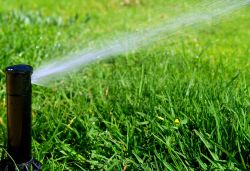 Modern sprinkler systems use sophisticated technology to ensure you minimize the impact on the environment. For example, built-in sensors, timers, and measurement devices will record and utilize every drop of water, producing substantially less waste. These systems will save you considerable money on your water bill, especially when you compare them to using a hose.
Modern sprinkler systems use sophisticated technology to ensure you minimize the impact on the environment. For example, built-in sensors, timers, and measurement devices will record and utilize every drop of water, producing substantially less waste. These systems will save you considerable money on your water bill, especially when you compare them to using a hose.
Also, many sprinkler owners have less need for herbicides, insecticides, and fertilizers, as the lawn remains healthy throughout the year. This saves further money and time, as you will not have to put potentially harmful chemicals into the soil.
4. Improve Flexibility
Generally, you can use sprinklers effectively, regardless of the content of your soil. This means that if the ground varies throughout your property, you can still ensure that everything receives sufficient hydration. However, heavy clay soil is the only type of ground that doesn't work well with sprinklers, as the density of the soil prevents absorption.
How to Maintain a Sprinkler System
To ensure the system stays in optimal condition and continues to serve your greenspace, routine maintenance is crucial. Once a month, inspect the system thoroughly, looking for leaks and clogs in the sprinkler heads. If you notice that one of the heads is not emitting water, remove it, wipe it with a dry cloth, and carefully pick out any soil or debris with a toothpick. Finally, rinse the head and replace it.
You should also check that each head has enough clearance to water the surrounding space adequately. Avoid overlapping heads whenever possible, as this can waste water. Furthermore, ensure that the spray does not impede frequently traveled sidewalks, driveways, and other paths. If it does, you may need to adjust the heads.
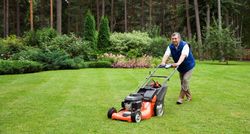 Maintain a regular schedule of mowing and weeding. This will ensure that the sprinkler heads are clear enough to operate effectively, as well as prevent plant life from encroaching the system. Exercise caution when mowing around sprinkler heads or over aboveground systems; using a push mower or handheld weeding device causes less damage than large tractors.
Maintain a regular schedule of mowing and weeding. This will ensure that the sprinkler heads are clear enough to operate effectively, as well as prevent plant life from encroaching the system. Exercise caution when mowing around sprinkler heads or over aboveground systems; using a push mower or handheld weeding device causes less damage than large tractors.
To ensure that the sprinklers are efficient, you should aerate the lawn and areas around trees and shrubs each year. This frees up space for healthy root growth and allows water to penetrate the soil.
For complex maintenance issues or repairs, the services of a professional will likely be necessary. A sprinkler contractor can tackle problems like leaky heads, drops in water pressure, malfunctioning sensors, and any winterization tasks that you might need.
How Often Should You Use Sprinklers?
Using your sprinklers during the late morning, afternoon, or early evening increases the likelihood of evaporation and water loss. When this happens, your landscape won’t receive enough nourishment. For the best results, water early in the morning or after sundown. Avoid running the sprinklers during high winds, as this will deliver uneven sprays and spotty irrigation.
Remember to water only when necessary. Overwatering can harm plant life similarly to underwatering, as you can erode the ground and prevent root growth. The soil should be dry to the touch before you activate the sprinklers.
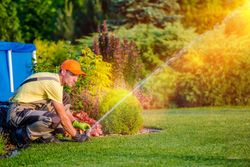 Also, take steps to minimize water runoff. When setting the timer on your sprinklers, program it to run for a few short intervals, rather than one long session. This allows the water to soak thoroughly into the soil between intervals, reducing runoff and erosion.
Also, take steps to minimize water runoff. When setting the timer on your sprinklers, program it to run for a few short intervals, rather than one long session. This allows the water to soak thoroughly into the soil between intervals, reducing runoff and erosion.
Once you learn how your greenspaces respond to seasonal temperatures and conditions, readjust the timer settings as necessary. This way, you won't have to manage every watering. Also, some sprinklers have sensors that automatically detect rainfall, freezing temperatures, or soil moisture levels; they will turn the system on or off accordingly to better protect your lawn.
When adding new vegetation to your yard, plant them in the spring or fall. Planting during the summer demands more water usage, and the new additions will take longer to establish root systems. Trees, grass, and perennials are among the plants that you can confidently sow in the fall, while spring is an excellent time for annuals and summer vegetables and fruits.
When you want to install a sprinkler system, trust Buzz Landscaping Inc. For more than 25 years, they have been serving Conway, AR, and the surrounding area. In addition to sprinkler systems, they offer landscape design and lawn maintenance services. Let them design and install the perfect sprinkler to keep your lawn green and beautiful all year. Call (501) 730-4515 to request an estimate. Visit them online for more information about their services.
About the Business
Have a question? Ask the experts!
Send your question

